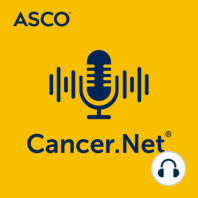6 min listen

Telemedicine in Cancer Care, with Ana María López, MD, MPH, FACP, S. Joseph Sirintrapun, MD, FASCP, FCAP, Joseph A. Greer, PhD, and Karen E. Edison, M…
Telemedicine in Cancer Care, with Ana María López, MD, MPH, FACP, S. Joseph Sirintrapun, MD, FASCP, FCAP, Joseph A. Greer, PhD, and Karen E. Edison, M…
ratings:
Length:
13 minutes
Released:
Oct 22, 2018
Format:
Podcast episode
Description
ASCO: You’re listening to a podcast from Cancer.Net. This cancer information website is produced by the American Society of Clinical Oncology, known as ASCO, the world’s leading professional organization for doctors who care for people with cancer. The purpose of this podcast is to educate and to inform. This is not a substitute for professional medical care and is not intended for use in the diagnosis or treatment of individual conditions. Guests on this podcast express their own opinions, experience, and conclusions. The mention of any product, service, organization, activity, or therapy should not be construed as an ASCO endorsement. Cancer research discussed in this podcast is ongoing, so the data described here may change as research progresses. While most people may think of visiting a doctor to receive medical care, today, technology such as computers and smartphones can connect doctors and patients who are separated physically. This is known as “telemedicine.” In today’s podcast, Dr. Ana María López, Dr. Joseph Sirintrapun, Dr. Joseph Greer, and Dr. Karen Edison will discuss their article from the 2018 ASCO Educational Book, “Telemedicine in Cancer Care,” including specific methods used in telemedicine, and the ways it helps bring high-quality medical care to people who might not otherwise be able to access this care. Dr. Lopez is the Vice Chair of Medical Oncology and Chief of Cancer Services at the Sidney Kimmel Cancer Center at Thomas Jefferson University. Dr. Sirintrapun is a pathologist and the Director of Pathology Informatics at the Memorial Sloan Kettering Cancer Center. Dr. Greer is the Clinical Director of Psychology and a research scientist in the Center for Psychiatric Oncology & Behavioral Sciences at the Massachusetts General Hospital Cancer Center. Dr. Karen Edison is the Philip C. Anderson Professor and Chair of the Department of Dermatology at the University of Missouri Health System, the Medical Director of the Missouri Telehealth Network, and the Director of the Center for Health Policy at the University of Missouri. Published annually, the Educational Book is a collection of articles written by ASCO Annual Meeting speakers and oncology experts. Each volume highlights the most compelling research and developments across the multidisciplinary fields of oncology. ASCO would like to thank Dr. Lopez, Dr. Sirintrapun, Dr. Greer, and Dr. Edison for discussing this topic. Dr. Lopez: Hello, welcome. My name is Dr. Ana María López. I’m a medical oncologist at the Sidney Kimmel Cancer Center at Thomas Jefferson University. Today we have a great panel on telemedicine and cancer care. I’m joined by Dr. Joseph Sirintrapun from Memorial Sloan Kettering Cancer Center, Dr. Joseph Greer of Massachusetts General Hospital, and Dr. Karen Edison from the University of Missouri Health System. In this podcast, we will be sharing some key points from our 2018 ASCO Educational Book article, “Telemedicine in Cancer Care.” I’d like to start by giving a quick overview of telemedicine. Telemedicine uses telecommunication technology, like smartphones and computers, to provide clinical care, to really facilitate access to clinical care. These virtual visits can be in real-time, that is, almost like the face-to-face visits, and the patient and the physician use a video connection, which could be an app. But it could also be done by utilizing what’s called Store-and-Forward. So when medical reports are transmitted, when images, like radiographs, or sound recordings, which might be from an echo, or a stethoscope, could be transmitted, and these are interpreted at an asynchronous time from the clinical visit. A combination of these approaches can often be used. And although these have been developed to care for patients at a distance, you can image that this can be very helpful in urban settings as well. Dr. Edison, can you tell us a little more about the history of telemedicine and how it might benefit patients with cancer? Dr. Edis
Released:
Oct 22, 2018
Format:
Podcast episode
Titles in the series (100)
The Importance of Hydration: In this podcast, we'll review why people with cancer have a higher risk of dehydration, what symptoms to watch out for that may signal dehydration, and offer five simple ways to help keep your body's fluid supply in balance. Quality of Life by Cancer.Net Podcast